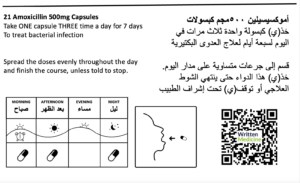Digitising pharmacy – Bilingual medication information on pharmacy dispensing labels
A service providing bilingual medication information is helping to reduce healthcare inequalities and medical errors in our capital.
Pharmacies across London are benefitting from the support of Written Medicine; a service providing bilingual dispensing labels in patients’ language of choice.
Founded in 2012, Written Medicine’s software is used by pharmacies and hospitals to translate and print medication information, instructions and warnings. Drawn from a dataset of 3,500 phrases, printed labels are available in fifteen different languages. The bi-lingual labels are supporting patients to take ownership of their treatment; giving them a better understanding of how to take their prescribed medication. The solution is helping to reduce errors, improve medication adherence and enhance patient safety and experience.
London North West University Healthcare NHS Trust (LNWH) has been using Written Medicine since 2016, starting from their outpatient pharmacy in Ealing Hospital. The Trust serves an ethnically and linguistically diverse demographic across North West London, which requires interpreting services in over 40 languages, mostly from South Asia, Middle East and Eastern Europe.
An audit to assess the quality and impact of the bilingual labelling service at LNWH report in 2019 stated, “post-service questionnaire revealed all patients would like the continuation of the service by their community pharmacies demonstrating the impact it has had in patient empowerment and adherence.”.
Written Medicine is now used across all three hospitals in LNWH, at the point of dispensing in outpatient pharmacy and integrated into the discharge system.
Poureya Aghakhani, Principal Pharmacist at Ealing Hospital, part of LNWH said, “Patients who are unable to speak English are less likely to understand their doctors, pharmacists and written instructions. This can stop them from taking their medication or may result in them taking it in an unhelpful or dangerous way.
“Giving patients information in a language they understand increases awareness around how and when medication should be taken. It empowers individuals to take ownership of their treatment, improving how they manage their conditions and reduces their risk of harm.
“It can also have a positive financial impact in terms of unused medications and avoidable hospital admissions.”
An audit to assess the quality and impact of the bilingual labelling service at London North West University Healthcare NHS Trust stated, “all patients would like the continuation of the service by their community pharmacies demonstrating the impact it has had in patient empowerment and adherence.”
With over 20 years of experience working in London’s diverse inner-city pharmacies, Ghalib Khan founded Written Medicine in 2012, due to experiencing language barriers with black and minority ethnic (BAME) service-users. He saw how easily they mismanaged their medication, putting them in harm’s way and into a cycle of ill health.
He observed patients who spoke English as a second language writing how to take their medicine in their first language on their medication box or over the dispensing label; sometimes on multiple drugs for multiple comorbidities. This gave him the idea of translating the English information and printing it in a bilingual format with the patient’s language of choice.
Talking about Written Medicine, Ghalib Khan, cofounder and director, also a fellow of NHS Innovation Accelerator, said “Making sure people understand the information they are given is a fundamental step in addressing health inequalities. We have been delighted to see the positive impact translated labels are having, not only in LNWH but across several pharmacies and three NHS trusts where this has been rolled out.
“Feedback across the board has been incredibly positive and an evaluation by Portsmouth University found that the labels significantly reduced the need for informal translation. Nearly all participants involved in the evaluation identified that they read the translated labels all or most of the time, and 89% reported that they’d understood the medical instructions from the translated labels. This is compared to 38% when provided in English.
“Over three quarters of patients wanted translated labels provided regularly and 66% thought it would influence their choice of pharmacy.
“As well as the identified patient benefits, having written information available which patients understand can help the health system avoid waste. Research shows that verbal instructions are forgotten between 40% – 80% of the time which suggests much of the time spent explaining instructions, without a written instruction is wasted. Having bilingual labels can help to reinforce what is being discussed to improve safety, increase adherence, reduce waste and avoid admissions to hospital.”
Written Medicine is currently available in LNWH, Bedfordshire Hospitals NHS Foundation Trust, East London NHS Foundation Trust and growing.
The software is available via a cloud-based platform and used across healthcare settings at the point of prescribing, dispensing and discharge. It can also be integrated into existing information technology.
There is a thorough four step language development process and full clinical safety report and hazard log. The product range is expanding to include over 500 pictograms to bridge most communication gaps.
Contact
To find out more about Written Medicine’s service contact: Mg.khan@writtenmedicine.com

